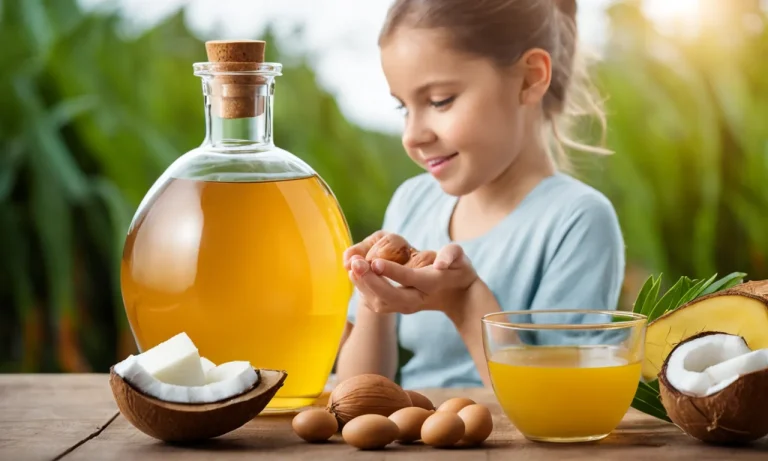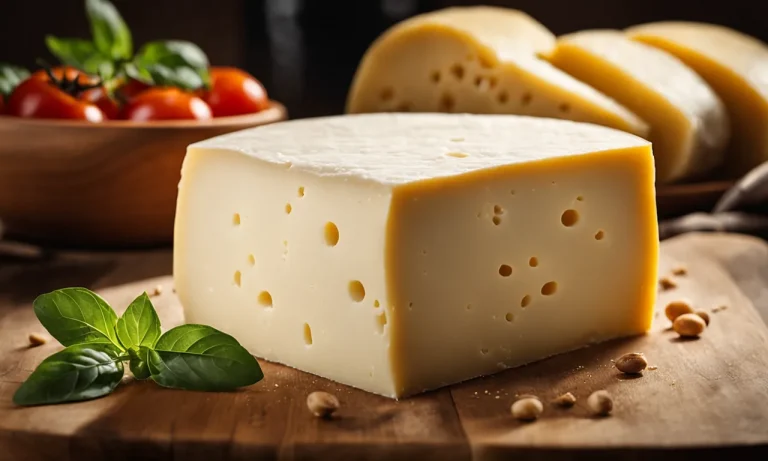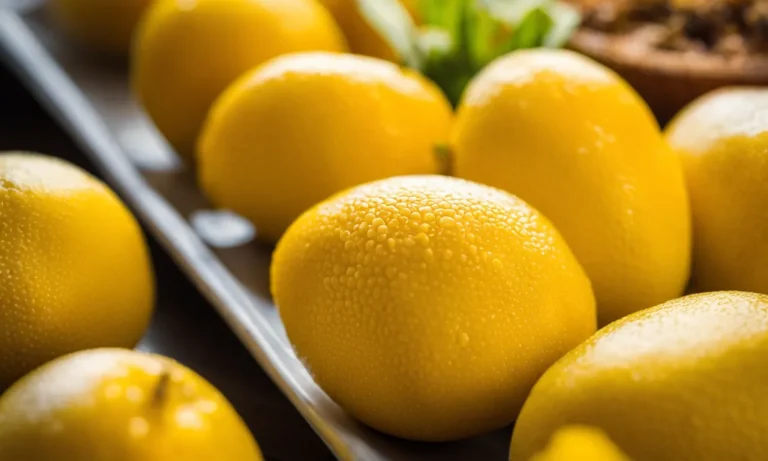Is Natural Butter Flavor Vegan? Examining The Ingredients
Butter flavoring is commonly found in packaged foods, adding rich, creamy notes reminiscent of dairy butter. But is natural butter flavor actually dairy-free and vegan? With confusing ingredient names like ‘natural flavor’ on labels, it can be tricky to tell.
In this comprehensive guide, we’ll examine what’s really in natural butter flavors, looking at the most common ingredients and production methods used by manufacturers.
What is Natural Butter Flavor?
Natural butter flavor is a common ingredient used in many food products to mimic the taste and aroma of real butter. It is often used in vegan and dairy-free products to provide a similar flavor profile without the use of animal-derived ingredients.
Definition and Production Methods
Natural butter flavor is typically derived from plant-based sources, such as nuts, seeds, or fruits. The exact ingredients and production methods can vary depending on the manufacturer and the specific product.
However, the goal is to create a flavoring agent that closely resembles the taste and smell of butter.
Manufacturers may use a combination of natural extracts, oils, and other flavor compounds to create natural butter flavor. These ingredients are carefully selected and blended to achieve the desired flavor profile.
It’s important to note that natural butter flavor does not contain actual dairy butter or any other animal-derived ingredients.
Common Ingredients: Diacetyl and Acetoin
Two common ingredients found in natural butter flavor are diacetyl and acetoin. These compounds are responsible for creating the distinct buttery taste and aroma.
Diacetyl is a naturally occurring compound that is found in many fermented foods, including butter. It is a yellow liquid with a strong buttery odor. Acetoin, on the other hand, is a chemical compound that is often used as a flavoring agent. It is a clear liquid with a sweet, buttery taste.
It’s worth noting that diacetyl has been associated with a condition known as “popcorn lung” when inhaled in high concentrations. However, the levels of diacetyl used in food products are generally considered safe for consumption.
Regulatory bodies, such as the Food and Drug Administration (FDA), closely monitor the use of diacetyl and other food additives to ensure they are used within safe limits.
When it comes to veganism, it’s important to check the specific ingredients listed on the product packaging to determine if the natural butter flavor is vegan-friendly. While natural butter flavor itself does not contain animal-derived ingredients, it’s possible that other additives or processing methods used in the production of the flavoring may not align with vegan principles.
It’s always a good idea to consult reliable sources and reach out to manufacturers for clarification if you have any doubts about the vegan status of a product. Websites like PETA provide comprehensive guides on vegan-friendly ingredients and offer resources to help individuals make informed choices.
Potential Animal-Derived Ingredients
When it comes to determining whether natural butter flavor is vegan, it is essential to examine the ingredients used in its production. While the term “natural” may suggest that the flavor is derived solely from plant-based sources, this is not always the case.
Some natural butter flavorings may contain animal-derived ingredients, which can make them unsuitable for those following a vegan lifestyle.
Milk Derivatives
One common animal-derived ingredient found in natural butter flavor is milk derivatives. These can include substances such as butterfat or milk powder, which are derived from cow’s milk. These ingredients are often used to enhance the flavor and texture of the butter flavoring.
It is important for vegans to be cautious when purchasing products containing natural butter flavor, as these milk derivatives can be present.
Casein and Whey Protein
Another potential animal-derived ingredient found in natural butter flavor is casein and whey protein. These proteins are derived from milk and are commonly used in food production as flavor enhancers and stabilizers.
While they may not be directly listed as ingredients in natural butter flavor, they can be present within the flavoring complex. Vegans should be aware of this and look for alternative options that explicitly state they are free from casein and whey protein.
Natural Flavor Complexes
The term “natural flavor” can be deceptive, as it can encompass a wide range of ingredients, including both plant and animal-derived substances. Natural flavor complexes are mixtures of various compounds designed to mimic the taste and aroma of butter.
While some natural flavor complexes may be derived solely from plant-based sources, others may include animal-derived ingredients. It is important for vegans to carefully read labels and look for certified vegan products that explicitly state they are free from any animal-derived ingredients.
It is worth noting that not all natural butter flavorings contain animal-derived ingredients. Some manufacturers produce vegan-friendly versions that use exclusively plant-based ingredients to achieve the desired flavor.
When in doubt, it is always best to reach out to the manufacturer or consult vegan-friendly websites for more information.
Vegan-Friendly Natural Butter Flavors
When it comes to veganism, individuals often find themselves questioning whether certain products or ingredients align with their ethical choices. One such ingredient is natural butter flavor. While traditional butter is derived from animal milk, natural butter flavor can be produced using plant-based methods, making it a vegan-friendly option for those following a plant-based lifestyle.
Plant-Based Production Methods
Natural butter flavor can be created using plant-based production methods, which involve extracting and distilling the flavors found in plants to replicate the taste of butter. This process avoids the use of any animal-derived ingredients, making it suitable for vegans.
By harnessing the natural flavors of plants, manufacturers are able to recreate the creamy, rich taste of butter without relying on animal products.
For example, one common plant-based method involves extracting oils from various nuts, such as almonds or cashews, which have a naturally rich and creamy taste. These oils can then be used to create a vegan-friendly natural butter flavor that can be incorporated into a wide range of vegan recipes.
Using Vegan Fatty Acids
In addition to plant-based extraction methods, vegan-friendly natural butter flavors can also be created using vegan fatty acids. Fatty acids are essential components of fats and oils, and by using plant-based sources for these fatty acids, manufacturers can produce vegan-friendly natural butter flavors.
One example of a plant-based source of fatty acids commonly used in vegan butter flavor production is coconut oil. Coconut oil contains a high concentration of saturated fats, which give it a similar creamy texture to traditional butter.
By utilizing coconut oil or other plant-based sources of fatty acids, natural butter flavor can be produced without any animal-derived ingredients.
Sourcing Vegan Vitamin Concentrates
In some cases, natural butter flavor may also contain vitamin concentrates to enhance its nutritional profile. When sourcing these vitamin concentrates, it’s important for manufacturers to ensure they are vegan-friendly and free from animal-derived sources.
By using plant-based vitamin concentrates, manufacturers can maintain the vegan-friendly status of their natural butter flavor. These plant-based vitamin concentrates can provide essential nutrients without the need for any animal products, allowing vegans to enjoy the flavor and potential health benefits of natural butter flavor without compromising their ethical choices.
For individuals who follow a vegan lifestyle, it’s important to carefully read ingredient labels and look for products that explicitly state they are vegan-friendly. Additionally, seeking out brands that prioritize transparency and provide detailed information about their production methods can help ensure that the natural butter flavor being consumed aligns with vegan principles.
Navigating Food Labels
When it comes to understanding whether a product is vegan or not, navigating food labels can sometimes be a challenge. With so many ingredients and terms to decipher, it’s important to know what to look for to ensure that the food you’re consuming aligns with your ethical choices.
Here are a few tips to help you navigate food labels and determine if natural butter flavor is vegan-friendly.
Look for Vegan Certification Symbols
One of the easiest ways to determine if a product is vegan is to look for vegan certification symbols. These symbols are typically displayed on the packaging and indicate that the product has been verified by a third-party organization as being free from animal-derived ingredients.
The most common vegan certification symbols include the Vegan Society logo and the Certified Vegan logo. By choosing products with these symbols, you can have peace of mind knowing that the natural butter flavor is vegan-friendly.
Contacting Manufacturers About Sourcing
If a product doesn’t have a vegan certification symbol, it’s worth reaching out to the manufacturer to inquire about the sourcing of their natural butter flavor. Some companies may use plant-based alternatives or synthetic ingredients to replicate the taste of butter without using any animal-derived components.
By contacting the manufacturer directly, you can gain a better understanding of their production process and determine if their natural butter flavor is vegan-friendly.
Common Non-Vegan Ingredients to Avoid
While natural butter flavor may seem like a straightforward ingredient, it’s essential to be aware of common non-vegan ingredients that could be hiding within. Some ingredients to watch out for include dairy-derived components such as milk powder, whey, or casein.
Additionally, some natural flavors can be derived from animal sources, so it’s crucial to look for specific information regarding the origin of the natural butter flavor. By familiarizing yourself with these ingredients, you can make informed decisions about the products you choose to include in your vegan lifestyle.
Remember, when it comes to determining if natural butter flavor is vegan, it’s important to read food labels carefully, look for vegan certification symbols, and contact manufacturers directly if needed.
By doing so, you can ensure that the products you consume align with your ethical choices and contribute to a cruelty-free lifestyle.
Vegan Butter Flavor Alternatives
For those following a vegan lifestyle, finding suitable alternatives to traditional butter flavor can be a challenge. However, there are several options available that can satisfy the craving for that rich, creamy taste without compromising your dietary choices.
Making Your Own Vegan Butter Flavor
One option is to make your own vegan butter flavor at home. This not only allows you to control the ingredients, but it also gives you the opportunity to experiment and customize the flavor to your liking. Here’s a simple recipe to get you started:
- Ingredients:
- 1 cup of refined coconut oil
- 1/4 cup of unsweetened soy milk
- 1 teaspoon of apple cider vinegar
- 1/2 teaspoon of salt
- 1/4 teaspoon of nutritional yeast
- Instructions:
- Melt the coconut oil in a microwave or on the stove.
- In a blender or food processor, combine the melted coconut oil, soy milk, apple cider vinegar, salt, and nutritional yeast.
- Blend until smooth and well combined.
- Pour the mixture into a container and refrigerate until solidified.
- Use as a spread or in cooking and baking recipes.
This homemade vegan butter flavor can be a great alternative to traditional butter in a variety of recipes, including baking, sautéing, and spreading on toast.
Purchasing Vegan-Labeled Products
If making your own butter flavor is not your thing, there are also plenty of vegan-labeled products available in stores. These products are specifically formulated to mimic the taste and texture of butter without using any animal-derived ingredients.
When shopping for vegan butter flavor alternatives, look for products that are labeled “vegan,” “plant-based,” or “dairy-free.” These products often use a combination of oils, such as coconut or olive oil, along with plant-based emulsifiers and flavorings to create a buttery taste.
It’s important to note that not all products labeled as “natural butter flavor” are vegan-friendly. Some may contain small amounts of dairy or animal-derived ingredients, so it’s always a good idea to check the ingredient list before making a purchase.
For more information on vegan butter flavor alternatives, you can visit reputable websites such as www.veganbutter.com or www.plantbasedbutter.com, which provide detailed reviews and recommendations for vegan-friendly products.
Remember, whether you choose to make your own vegan butter flavor or purchase a pre-made product, there are plenty of options available to satisfy your taste buds while staying true to your vegan lifestyle.
Conclusion
With confusing labels and ingredient names like ‘natural flavors’, it can be tricky to determine if a butter flavoring is truly vegan-friendly. While some natural butter flavors rely on vegan ingredients and production methods, others may contain traces of dairy or animal products.
As with any packaged food, thorough research and contacting manufacturers is key for vegans seeking to avoid animal-derived ingredients.







